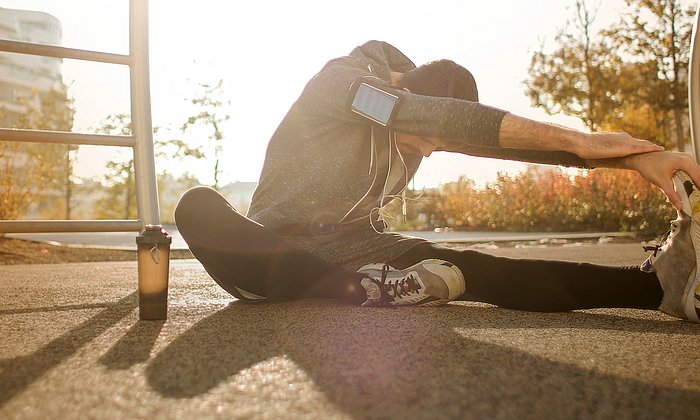International 2022 Movement Report Card
Barely passing grade of "C-" for children and youth in Germany
![[Translate to English:] [Translate to English:]](/fileadmin/user_upload_87/_processed_/c/b/csm_iStock-1338989943_3ac6917923.jpg)
Scientific studies, national surveys and reports by governmental and non-governmental organizations were consulted for the Movement Report Card. The objective is to assess the movement and sitting behavior of children and youth based on nine categories and using a school grading system. This year particular attention was paid to existing differences between boys and girls. In addition, the impacts of the Corona pandemic were included in the current evaluation.
Much too little physical activity
Germany was only able to earn a grade of C- in the category "Overall physical activity". Only about one third of the children (27 to 33 percent) meet the movement levels recommended by the World Health Organization (WHO). Boys show a tendency to get more movement than girls. Children and youth in other nations are in some cases significantly more active. The best grades worldwide went to Slovenia and Finland, followed by Japan, South Africa and the USA. But many European countries like Croatia, Spain and Slovakia did better than Germany.
Study leader Prof. Yolanda Demetriou, holder of the Chair of Sports and Health Education at TUM, sums up: "Compared to the first Physical Activity Report 2018, the Corona pandemic has even exacerbated the situation. We need to do more to get our children and young people moving more! If girls and boys do not move enough as children, there is a high risk that they will do the same as adults. This in turn promotes the development of lifestyle diseases such as obesity, heart attacks and strokes. In Germany, physical inactivity is the fifth leading cause of death."
Co-study leader Prof. Anne Reimers from the Friedrich Alexander University of Erlangen-Nuremberg demands: "In Germany, children and adolescents must be encouraged and supported to develop a love of movement, in line with our motto 'Don't stay seated - get moving! But the environment of children and young people should also be made even more movement-friendly."
Good infrastructure for sports
However, Germany received better grades when it comes to basic prerequisites which organized sports, schools, municipality and environment offer: 60 to 70 percent of children and youth regularly participate in organized sports, for example in clubs. Very many primary school-aged children belong to sports clubs. During the Corona pandemic, the amount of sports in clubs dropped significantly due to the lockdowns and in some cases ceased altogether.
Physical education in Germany is obligatory for all children and youth, and the majority of planned instruction also takes place. Structurally almost all schools (97 percent) have a gymnasium and 66 percent of schools have a movement-friendly schoolyard. On the other hand, physical education classes hardly ever took place during the COVID-19 pandemic and were even prohibited in some cases. There are hardly any quality assured online resources or corresponding lesson concepts.
Germany also did well in the category "Community". Between 66 and 77 percent of children and youth indicated that they can play outdoors without obstacles such as automobile traffic or large streets. Over 80 percent of the children and youth live near a playground. In addition, 80 percent have access to a park or green space in the vicinity of their residence, with approximately 56 percent living in the vicinity of a public swimming pool.
Compared with the international situation of the 57 countries, Slovenia, Japan and the Scandinavian countries Denmark and Finland scored best with an overall grade of B-. Germany is more in the middle range, with its grade of C-, although it scores in the top third for the areas of Sports, Schools and Community. Thus a clear contrast comes to light: While the external influence factors and the environment receive fairly high grades, there are clear weaknesses in individual movement behavior.
In the interest of rendering lifeworlds even more movement-friendly, curriculum supervisors from the 57 participating countries recommend among other things improving opportunities for physical activity at school, as well as increasing the number of weekly hours spent on physical education. In addition, access to public spaces, green spaces, playgrounds and sports complexes is to be expanded.
The "Active Healthy Kids Germany" network
The German Movement Report Card was prepared by the "Active Healthy Kids Germany" network (AHKG). A total of 15 research facilities participated in Germany. Members of the TUM Department of Sport and Health Sciences including Prof. Demetriou and Prof. Karsten Köhler, head of the Professorship for Exercise, Nutrition and Health, as well as Dr. David Sturm of the Professorship for Educational Science in Sport and Health, took part.
"Active Healthy Kids Germany" was supported by health insurance carrier vivida bkk and the "Die Gesundarbeiter" foundation. "We should see the results of the current Movement Report Card as a clear wake-up call," says Roland Frimmersdorf, Managing Director of the "Die Gesundarbeiter – Zukunftsverantwortung Gesundheit" foundation (The Health Workers – Responsibility of the Health of the Future). "We have to succeed in reaching young people in their lifeworlds and help them put more movement in their daily routines. The earlier we instill enjoyment of sports and movement in them, the better," Frimmersdorf adds.
Active Healthy Kids Germany partners with scientists at the following institutions: Technical University of Munich (TUM), FAU (Friedrich-Alexander-Universität), Leibniz Institute for Prevention Research and Epidemiology BIPS Bremen, University of Bayreuth, dsj German youth sports organization, DOSB German Olympic Sports Confederation, Ulm University, University of Education Weingarten, Robert Koch Institute/Berlin, Justus Liebig University Gießen (JLU), MSH Medical School Hamburg, Karlsruhe Institute of Technology, Association of German Sport Teachers; Deutsche Berufsakademie (Sport und Gesundheit German Professional Academy for Sport and Health) Baunatal; Leipzig University.
Technical University of Munich
Corporate Communications Center
- Romy Schwaiger und Ulrich Meyer
- presse@tum.de
- Teamwebsite
Contacts to this article:
TUM - Technical University of Munich
Professorship for Educational Science in Sport and Health
Prof. Yolanda Demetriou
Tel.: 089 289 24686
Email: yolanda.demetriou@tum.de

